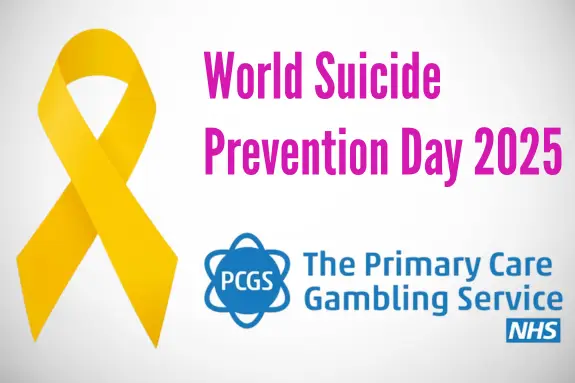We use cookies to help provide you with the best possible online experience.
By using this site, you agree that we may store and access cookies on your device. Cookie policy.
Cookie settings.
Functional Cookies
Functional Cookies are enabled by default at all times so that we can save your preferences for cookie settings and ensure site works and delivers best experience.
3rd Party Cookies
This website uses Google Analytics to collect anonymous information such as the number of visitors to the site, and the most popular pages.
Keeping this cookie enabled helps us to improve our website.
World Suicide Prevention Day Blog
World Suicide Prevention Day is run by the International Association for Suicide Prevention and takes place every year on the 10th of September. The day gives us a chance to reflect on and reinforce the message that suicide can be prevented, as well as raising awareness of support and reducing stigma. In this blog, we’ll be looking at the relationship between gambling harm and suicidality, the support that’s available for those experiencing gambling harm in Britain, and advice from Samaritans on how to support yourself if you’re experiencing suicidal thoughts.
Gambling harm refers to the negative impacts from gambling on the health and wellbeing of individuals, families, and communities. This harm can impact multiple aspects of peoples’ lives including mental wellbeing, physical wellbeing, financial wellbeing, and more. This can result in those affected experiencing serious negative consequences such as relationship breakdowns or loss of employment, and at worst contribute to loss of life by suicide.

Research has examined the link between suicidality and problem gambling. For example, in 2019 GambleAware and The Gambling Commission found that respondents who were problem gamblers were more likely to have thought about suicide or have attempted suicide in the past 12 months [1]. They reported that 19% of problem gamblers in their sample had thought about suicide in the last year, compared to only 4% in the general population. On top of this, 5% of problem gamblers reported that they had made a suicide attempt in the last year compared to 0.6% of other respondents. Another study investigated problem gambling and suicide attempts in young adults (aged 16–24) and found that problem gambling was correlated with a higher prevalence of suicide attempts in young men and women, even when accounting for factors such as anxiety and life satisfaction [2]. Research such as this has led to OHID’s estimation that there are between 117 and 496 gambling-related suicides in England every year [3].
With the seriousness of this issue shown in the data, it’s important that we make sure that we’re providing support to those experiencing gambling harm. The Primary Care Gambling Service provides free and confidential support to adults across Britain who are experiencing gambling harms. We use a multidisciplinary approach and provide holistic care for our patients. We have several support offers available such as one-to-one therapies, group therapy sessions, and affected others support for those impacted by someone else’s gambling. To self-refer for PCGS, you can fill out our registration form or call us during standard working hours on 0300 0300 111. If you require 24/7 support, our partners GamCare run the National Gambling Helpline which you can call at any time of the day on 0808 8020 133. If you’re struggling with suicidal thoughts, you can call Samaritans for help on 116 123. If you’re at immediate risk, please call 999 or visit your nearest A&E.
Outside of the support focussed on gambling harms, it’s important to understand how to support oneself and others experiencing suicidality. Samaritans put together a piece using feedback from those with lived experience of suicidality [4]. They suggested the following five ideas for supporting yourself if you’re struggling with suicidal thoughts:
1. It’s helpful to talk about your feelings
Those with lived experience said that talking about their feelings helped when they were feeling suicidal. Whether it’s with a loved one, Samaritans, or your PCGS therapist, talking about how you’re feeling can have a very positive impact.
2. People distract themselves
Finding a way to distract yourself can help take your mind off overwhelming feelings. This could include reading a book, listening to music, or small acts of self-care like having a snack or a glass of water.
3. Remember the good things in life
Some find it useful to remember the good things in life. Some people with lived experience recommend collecting things important to you for these moments, such as photos of loved ones, a list of reasons to stay, and helpful quotes or helplines.
4. Take it one day at a time
If the future feels overwhelming, it can be helpful to take things one day or even one moment at a time. People with lived experience suggest trying grounding or breathing techniques, writing down your feelings, and breaking things down into manageable chunks.
5. Remember that you are not alone
Speaking to someone or just being around other people can help in moments of crisis. Try keeping a list of contacts for people and organisations that you can trust in case you need to speak to someone, and if you’re in immediate risk don’t be afraid to dial 999.
Sources
[1] Wardle, H., Dymond, S., John, A., & McManus, S. (2019). Problem gambling and suicidal thoughts, suicide attempts and non-suicidal self-harm in England: evidence from the Adult Psychiatric Morbidity Survey 2007. Birmingham: Gambling Commission.
[2] Wardle, H., & McManus, S. (2021). Suicidality and gambling among young adults in Great Britain: results from a cross-sectional online survey. The Lancet Public Health, 6(1), e39-e49.
[3] Office for Health Improvements and Disparities (2023). The economic and social cost of harms associated with gambling in England, Evidence update 2023
[4] Samaritans. Ideas for how to support yourself if you’re struggling with suicidal thoughts
Published: Sep 10, 2025
